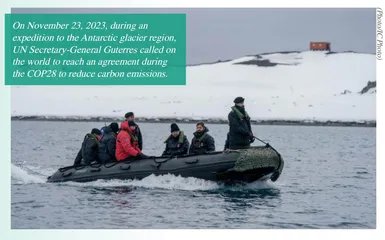Global Climate Governance and China’s Contributions in Perspective of a Community with a Shared Future for Mankind
作者: Li Shuyun

In recent years, global climate changes have been rapid, unprecedented and intensifying. Increasingly worsened conditions of existence are forcing vulnerable populations toward destruction. According to the Contribution of Working Group I to the Sixth Assessment Report (AR6) of the Intergovernmental Panel on Climate Change (IPCC), observed increases in well-mixed greenhouse gas concentrations since around 1750 are unequivocally caused by human activities, and if global warming continues to follow current trends, the global climate will move towards an irreversible tipping point of systemic collapse. Just as the impact of climate change on human society is irreversible, the process of global climate governance will not allow reversal as well. In face of severe challenges of global climate change, no country is immune. Guided by the vision of a community with a shared future for mankind, China has made unique contributions to meeting challenges by taking concrete actions of reducing carbon, mitigating pollution and expanding green development.
New Challenges Facing Global Climate Governance
As a branch of global governance, global climate governance faces many challenges: on the one hand, the issues such as imperfect climate governance system and the lack of leadership; on the other hand, the reluctance of developed countries to take historical responsibility, resulting in global climate governance being short of sufficient public goods; both insufficient binding force of plural governance framework centered on the United Nations Framework Convention on Climate Change, and the fragmentation of governance rules and institutions; both the dilemma of collective action and the tragedy of the commons caused by free riding. In 2023, geopolitical conflicts intensified, with food, energy and debt crises overlapping, and various challenges piling up. As existing problems were yet to be solved, new problems emerged one after another.
I. Interdependence Between Mankind and Ecosystems Deepens, Making Global Climate Governance More Difficult
As Earth being a natural whole, the climate change of one region will inevitably lead to that of another region correspondingly. Deepening interdependence between mankind and ecosystems intensifies vulnerability of ecosystems, and global climate change increasingly affects human life safety. According to statistics, from 2010 to 2019, weather-related events displaced about 23 million people each year. According to the Synthesis Report of AR6, about 3.3 to 3.6 billion people worldwide were in a highly vulnerable environment for climate change. As global warming continued to occur and adaptive effectiveness declined, limited adaptation and poor adaptation were to cause additional damage to vulnerable populations.
The benefit spillover effect of global climate governance increases uncertainty of climate governance. When governance benefits cannot be fully internalized into domestic interests resulting in benefits spilling over, making it necessary to increase the burden of governance costs for countries concerned, willingness of some countries to use climate resources is on the rise and that for climate governance, on the decline, which aggravates the vulnerability of ecosystems and the threat to mankind, leading to soaring difficulty of global climate governance.
II. Geopolitical Competition of Major Countries Becoming Unprecedentedly Fierce, Adding to Uncertainties of Global Climate Governance
According to the Annual Report of International Politics and Security (2023) released by the Institute of World Economics and Politics, Chinese Academy of Social Sciences, the year 2022 witnessed the most violent turbulence and changes in the international political pattern and situation since the end of the Cold War. The fierce competition of the major countries and geopolitical conflict had a significant impact on the pattern of international relations. Lasting COVID-19 pandemic and frequent occurrence of extreme weather pushed up global crises such as energy, food and debt crises, which made global governance difficult. The intensified geopolitical competition between the major countries had an important impact on global governance, resulting in global climate governance facing greater challenges and uncertainties.
The ongoing Ukraine crisis since 2022 has marked an infection point in energy security, food security and sustainable development, and intensified geopolitical conflicts, whereas the Western energy sanctions against Russia have brought many European countries into energy crisis, which has also had a huge impact on global energy market. With 2022 Nord Stream pipeline sabotage, Germany, France, Austria, The Netherlands, Italy and Britain were forced to restart coal power, directly increasing Europe’s carbon emissions.
The response to climate change was once hopeful to be an important support for building a new model of major-country relationship between China and the US, but the US crackdown on China dashed that hope. As Western countries had an absolute advantage in technology to tackle climate change, according to the provisions of the Paris Agreement, developed countries had the responsibility and obligation to provide technical support to developing countries. Against the background of intensified geopolitical competition, the unreasonable sanctions imposed by the US on China would undoubtedly affect the in-depth cooperation between China and the US in global climate governance and bring greater uncertainty to global climate governance.